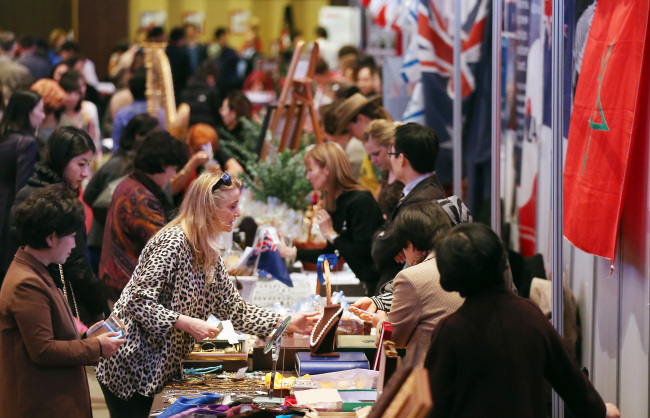Seoul International Women’s Association held its annual charity SIWA and Diplomatic Community Bazaar in the 63 Building in Yeouido on Monday.
Stalls run by dozens of embassies, organizations and charitable groups sold Christmas and cultural items and food to raise money for the SIWA Welfare Fund.
The bazaar was run by Sophia Barry, who is SIWA’s new president but has been in charge of the bazaar organizing committee since seizing the chance in June.
Stalls run by dozens of embassies, organizations and charitable groups sold Christmas and cultural items and food to raise money for the SIWA Welfare Fund.
The bazaar was run by Sophia Barry, who is SIWA’s new president but has been in charge of the bazaar organizing committee since seizing the chance in June.

She had just finished a contract working as an accountant in Ulsan and had relocated with her husband.
“I arrived in Seoul on the first of June and I took up and ran with it,” she said.
“I came straight from working full-time to Seoul and they were looking for a bazaar chair so I took the task,” she said. “I was working full-time so being a full-time lady of leisure didn’t suit me straight away, so I came to voluntary work.”
But it has been no part-time affair. Barry says she has been working overtime on the bazaar.
“It has been a full-time job and my husband will certainly support that,” she said.
The fund raises about 100 million won ($100,000) a year, mostly through the bazaar, and is allocated by the group’s welfare committee.
The foundation only gives to registered charities that help people in Korea, and assesses the applications for funding based on need. As a result, Anjali Ramakrishna, chair of the welfare committee, said that much of the money went toward people’s basic needs, such as heating, especially in the winter months.
But the committee seeks to go beyond that when it can. She gave the example of Dream Tree Village orphanage, which asked for a camera and two computers for a photography project in which mentors take children out on photography trips and then discuss their work.
“For another group it was getting the water pipes because the pipes had eroded,” she said. “We do a lot of basic stuff, but we also try to do things that some people might say are not basic, but we feel it’s improved the quality of life for these children. It’s given them something exciting to look forward to.”
In another example, the Rainbow Community for disabled people in Gwangju asked for tents and sleeping bags.
“They said the people who we support will use it, and sometimes when their families come they can use it with their families for camping,” said Ramakrishna. “That’s really nice because camping here has become so popular over the last few years.”
SIWA also teams up with other big projects that are too much for the association to take on by itself.
To ensure the money goes to the right place, SIWA audits recipients carefully. Each one must get three visits by welfare committee members before it can receive funds.
As well as a chance to give back ― Ramakrishna points out that they do not pay members’ expenses for the visits ― this is a unique chance to get to know the country better.
“There are lots of little things happening in Korea that I would never know about but for the fact that we do these visits or I read the reports,” said Ramakrishna. “There is so much going on.”
She’s often impressed by the services that the organizations provide, such as on a visit to the Columban Day Care Center in Mokpo.
“I’ve been working with people with disabilities for years, in India, the U.S. and Kenya, and I can’t tell you how impressed I was,” she said.
The operator, a Columban nun, built seven apartments on upper floors to allow disabled people to live independently with support nearby.
“They are small. Two people to a room. But they are airy, well lit, have a little kitchenette with a proper stove,” said Ramakrishna.
“She said to me, ‘My philosophy is, if I want to live there, someone else would want to live there. I see no reason why someone with a disability should live in a dark place with 10 to a room.’”
“That’s the model in the West that people have been trying to build for the longest time.”
And return trips ― such as the one to Mokpo ― are a chance to see the fruits of the group’s fund-raising work.
“She said, ‘Oh this is courtesy SIWA’ ― the screen they put on the windows some years ago. Then they have a bakery van to which SIWA had contributed, because they ran a little bakery business.”
“It was nice to see everything in action, where the money actually went,” she said.
By Paul Kerry (paulkerry@heraldcorp.com)
-
Articles by Korea Herald




















![[Today’s K-pop] BTS pop-up event to come to Seoul](http://res.heraldm.com/phpwas/restmb_idxmake.php?idx=642&simg=/content/image/2024/04/17/20240417050734_0.jpg&u=)